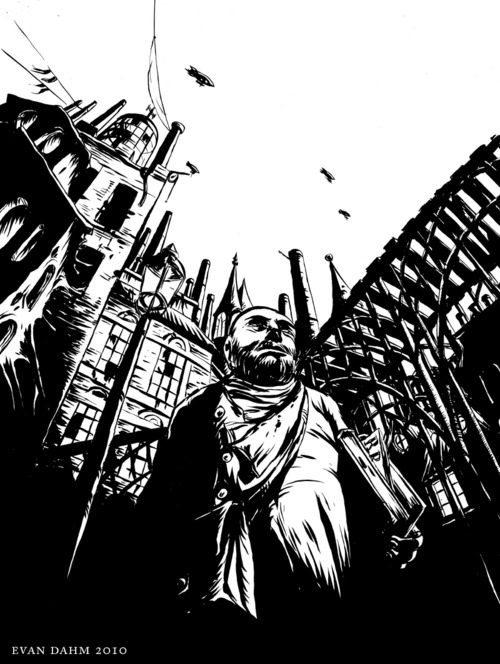The one who made the biggest mistakes and lived is the main character.
The work is monumental. Bas-Lag strikes me as a parallel to Middle-Earth, aimed at older readers in the current century, but as rich, textured, surprising, and merciless as Tolkien’s creation. It is so large, and in the remainder of Miéville’s works, populated by only one minor character from Perdido Street Station, that I am too daunted to pick up Iron Council or Scar. But it is a work of monumental creativity, of intimate detail and broad sweep, of great weight and light and variation. What daunts me as well – as a wannabe writer – is the thought of my world and my characters and my scenes placed alongside these.
My first impression of New Crobuzon is that too many of its residents are adjectives. I was able to forgive the city this impression, however, when I realized how much work these often-denigrated citizens contributed in the story. The world is so large, detailed, and central to the main characters’ understanding of what’s going on, and consequently the reader’s, that less description might leave the reader guessing and filling in gaps with assumptions not suited to the plot. In fact, I found myself struggling to throw off the oppressive yoke of a few misperceptions as I read through the book.
The names of things are so evocative, cat-and-mousey crisscrossed references and dead-ends in half a dozen real and imaginary languages, archaic words with real meaning strewn misleadingly among them, I give myself a break on the misunderstandings. I read of the garuda, and pictured ganesha, and had to unpicture elephants for hundreds of pages. I had New Crobuzon organized like Paris, and never rid myself of the scale, barely overcoming the east-west transposition (the rivers in NC flow west to east through the city). Neighborhoods, rivers and train lines sound like absurd cognates and mistranslations, mondegreens, or the results of auditory processing disorder – Salacus Fields, Bonetown, The Canker, Griss Twist, Sobek Croix, Spit Hearth…
I don’t know if the cleaning construct had eyes.
My misunderstandings pile atop one another. I think I have a mental image of the khepri, and then I google people’s drawings of them, and I’m astonished all over again. I had been thinking of Lin as cute, seeing increasingly through Isaac’s eyes…
I actually finished the book days ago – a week, maybe, and at the bookstore this weekend, I almost bought The Scar, also set at least in part in Bas-Lag, like a junkie unable to let the feeling die away completely before the next hit. (Don’t worry, mom – that’s only a literary reference.) It scared me a little to try to write about it. At a distance, having finished two other books and read hours aloud to my younger son (no, not PSS, but Karen Hesse’s unconventional Stowaway, very appropriate for kids a couple of years older than him, and not too bad for him), I thought I could observe more about it, or at least admit to being overwhelmed.
The only real observation I have is a political conjecture I’m far from answering. I know Miéville ran as a socialist MP in England, but I can’t decipher whether Perdido Street Station is a warning tale of the slippery slope of tolerance (with a very long fall, I thought more at first, less as I read past the halfway point), a celebration of anarchy, or unrelated to the spectrum of human political alignments – on earth, that is. New Crobuzon seems to get by on a mixture of totalitarianism, corruption, and momentum. The mayor (with the great name Rudgutter, and a gruesome and sad method of dealing with a medical problem) strives to rule with an iron fist, but corruption is… the adjectives “rife” and “endemic” need to be blended and raised exponentially, and true to a French historical annaliste worldview, which I suspect Miéville at least partly shares, the majority of events and situations proceed without deference to authority.
I will probably have to read this again someday, and I both dread and look forward to the dangers that entails. Just in case, I’m bringing along some scissors.
Oh, and here's a great fanart of Isaac dan der Grimnebulin, the fascinatingly flawed protagonist, by an artist posting as Evan Dahm.
Oh, and here's a great fanart of Isaac dan der Grimnebulin, the fascinatingly flawed protagonist, by an artist posting as Evan Dahm.


No comments:
Post a Comment